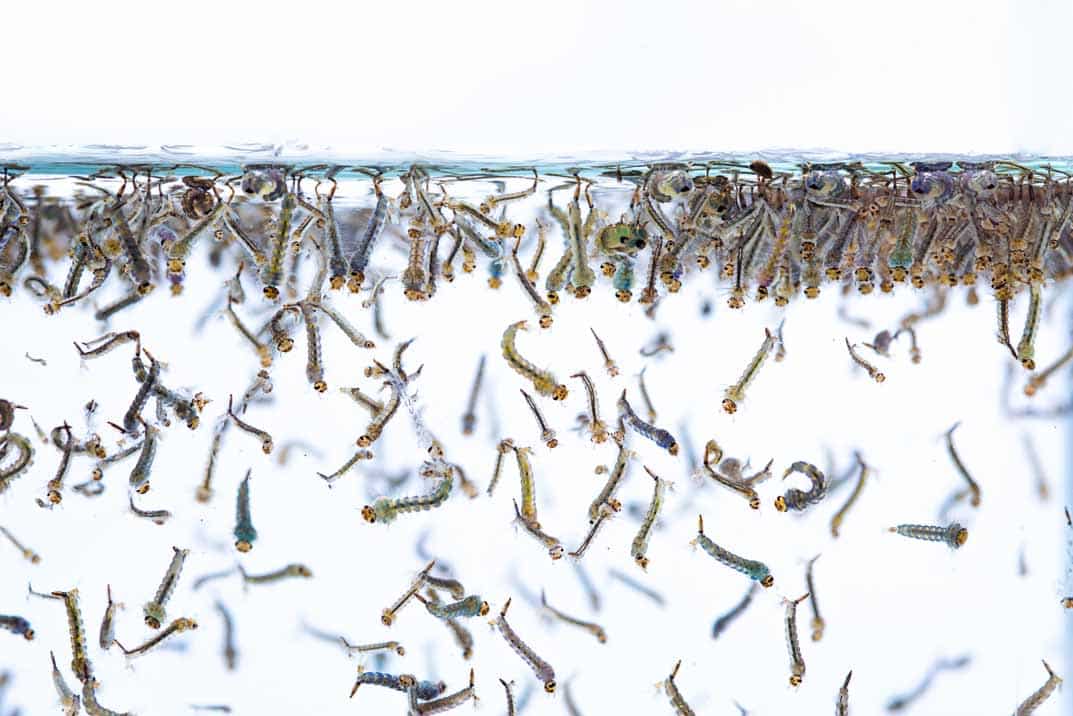When it comes to effective mosquito control, one of the best starting points is understanding the mosquito life cycle. After all, mosquitos aren’t just annoying pests; they also pose health risks by transmitting diseases like West Nile virus and other nasty pathogens. If you know the stages of their development and how to break the chain at each stage, you’ll be much better equipped to tackle infestations at home.
Why Does the Mosquito Life Cycle Matter?
Every summer, we see Raleigh residents dealing with itchy bites and constant buzzing in their yards. It’s tempting to rely on a single quick fix—like spraying an insecticide around the perimeter—but mosquitoes are stubborn creatures. They can complete a life cycle in as little as one to two weeks, and some species are even faster. By learning how mosquitos progress from egg to adult, you’ll gain insights into where and when they’re most vulnerable to intervention. It’s like spotting the weak link in a chain—once you identify it, you can break the entire process.
According to the Centers for Disease Control and Prevention (CDC), there are over 200 species of mosquitoes in the United States alone, and many thrive in warm, humid environments like North Carolina. With our mild winters and hot summers, it’s practically paradise for them—unless we stay proactive about control.
The Four Stages of a Mosquito’s Life
Mosquitoes undergo a process known as “complete metamorphosis,” which means they experience four distinct life stages: egg, larva, pupa, and adult. Let’s take a look at each stage in detail.
- Egg Stage: After a female mosquito has fed on a host (usually drawing blood to get the nutrients needed for eggs), she looks for standing water or damp surfaces to lay her eggs. Mosquito eggs can hatch within 24-48 hours, especially in the warm temperatures typical of a Raleigh summer.
- Larva Stage (“Wrigglers”): Once eggs hatch, tiny larvae emerge and start feeding on microorganisms in the water. These larvae, often called wrigglers, must come to the surface to breathe. They’re vulnerable at this stage because any disturbance or reduction in water quality can impact their survival.
- Pupa Stage (“Tumblers”): After a week or so as larvae, mosquitoes change into pupae (sometimes called tumblers). Pupae don’t feed but continue to develop in water. They’re also somewhat mobile but spend most of their time near the water’s surface. This stage usually lasts a few days until the adult mosquito is ready to emerge.
- Adult Stage: Once the pupae transform, adult mosquitoes break through the water’s surface and take flight. Males typically feed on nectar, while females are the ones seeking blood meals. An adult mosquito can live several weeks if the conditions are favorable.
Identifying Breeding Sites Around Your Home
In Raleigh, there’s no shortage of places mosquitoes love to breed. Any stagnant water is essentially an open invitation for them to lay eggs. Here are some common culprits we see during home inspections:
- Neglected birdbaths
- Clogged gutters
- Children’s toys left in the yard
- Old tires
- Planters and flowerpots with poor drainage
- Outdoor pet water bowls
These items might seem harmless, but they can hold water long enough for eggs to hatch and larvae to develop. In fact, a single ounce of standing water can support hundreds of mosquito larvae. That’s why removing or reducing standing water is often the first step in any comprehensive mosquito control strategy.
Targeting Mosquitos at Each Stage
To effectively control mosquitoes, it’s crucial to know when and how to intervene in their life cycle. Here’s what you can do at each stage:
Egg Stage
The best strategy here is prevention. If you eliminate standing water around your home, female mosquitoes will have fewer places to lay their eggs. At Wake Pest, we encourage you to do a weekly walk-around of your property. Tip over or empty anything that collects water, from flowerpot saucers to kiddie pools. Ensuring your yard is free of stagnant water is often the easiest and most cost-effective measure you can take.
Larva and Pupa Stage
Sometimes, you can’t remove every bit of standing water—especially if you have decorative ponds or water features in your yard. In these cases, consider using larvicides, which are products designed to kill mosquito larvae. These can come in the form of “dunks” that you place in the water or pellets you sprinkle on the surface. They’re generally safe for fish, birds, and other wildlife when used properly. If you have trouble selecting the right product or want to avoid handling chemicals, feel free to consult with our Wake Pest team. We’re happy to recommend and apply the proper treatments.
Adult Stage
When mosquitoes have already reached adulthood, you need a different approach. Adulticides—sprays or fogs—can help reduce the adult population around your property. Various products are available on the market, but we recommend working with pest control professionals to apply adulticides properly and safely. We have the training and equipment to target high-risk areas without overapplying chemicals where they aren’t needed. This approach is especially important to maintain a healthy balance in your outdoor spaces and avoid harming beneficial insects like bees and butterflies.
Common Mistakes Homeowners Make
Sometimes, despite good intentions, homeowners make common mistakes that can unintentionally worsen the mosquito problem. Here are a few pitfalls we frequently see:
- Overwatering Lawns: Keeping your grass too wet can lead to puddles that become breeding grounds.
- Skipping Gutter Maintenance: Clogged gutters often trap water for days or weeks, giving mosquitoes ample time to hatch.
- Relying Solely on Candles or Wristbands: While citronella candles and mosquito-repellent wristbands may offer slight relief, they don’t address the root cause—breeding and resting sites.
- Using Products Incorrectly: Applying chemicals at the wrong time or in the wrong concentration can be ineffective and potentially unsafe.
The easiest way to avoid these mistakes is to stay vigilant, maintain your yard regularly, and consult professionals if you’re unsure about the right steps.
Monitoring Mosquito Populations
We often get asked, “How do I know if I’m really making a dent in the mosquito population?” One tactic we recommend is simple observation: pay attention to whether you’re seeing fewer mosquitoes at dusk or notice fewer itchy bites. You can also use traps that lure mosquitoes in with carbon dioxide or special attractants. While these traps won’t single-handedly eradicate your mosquito problem, they can help you gauge the density of mosquitoes around your property and whether your control measures are working.
Environmental Considerations
At Wake Pest, we take environmental stewardship seriously. Raleigh’s ecosystem includes many beneficial insects and wildlife that play crucial roles, from pollinating plants to controlling other pest populations. When treating for mosquitoes, we want to minimize any potential harm to these good guys. That’s why we often focus on an integrated approach—identifying and targeting breeding sites, using larvicides where necessary, and applying adulticides judiciously.
By focusing on the mosquito life cycle, we’re able to break it efficiently and reduce the impact on other parts of the environment. Not all solutions need to be chemical-based, either. Sometimes, simply adding a fountain to a birdbath or a water feature can disrupt the water’s stillness enough to prevent mosquitoes from breeding there.
Professional Mosquito Control Services
We understand that tackling mosquitoes can be daunting. Even with knowledge of the life cycle, there’s still a lot of work involved—from consistent yard maintenance to selecting and applying the right treatments. That’s where we come in. As a Raleigh-based company, we know exactly how to approach mosquito control in our climate and environment. Our team is trained to:
- Conduct thorough inspections to locate breeding and resting sites
- Apply targeted treatments at the correct times
- Provide ongoing support and advice for prevention
- Use environmentally responsible products
- Tailor solutions to your home’s unique needs
If you’re noticing a serious mosquito problem, professional intervention can save you time, money, and aggravation in the long run. With the right plan in place, you’ll be able to enjoy summer nights on your porch or backyard barbecues without constantly swatting away those relentless biters.
Key Takeaways
Understanding the mosquito life cycle is the foundation of successful control. To recap:
- Mosquitoes go through four stages: egg, larva, pupa, and adult.
- Each stage has specific vulnerabilities that we can target to break the cycle.
- Simple preventive measures, like dumping standing water, can have a huge impact.
- Larvicides and adulticides work best when used correctly and strategically.
- Professional pest control services offer the advantage of trained eyes and specialized treatments.
By combining your knowledge of mosquito biology with practical prevention and treatment strategies, you can create a yard that’s far less inviting to these pesky insects. That means fewer bites, less worry about mosquito-borne illnesses, and a more enjoyable outdoor experience for you and your family.
If you have any questions or need help evaluating your home’s mosquito situation, feel free to reach out to us at Wake Pest. We’re here to help our neighbors in Raleigh and surrounding areas find peace of mind and reclaim their outdoor spaces. After all, your home is your haven—mosquitoes don’t belong in it!

